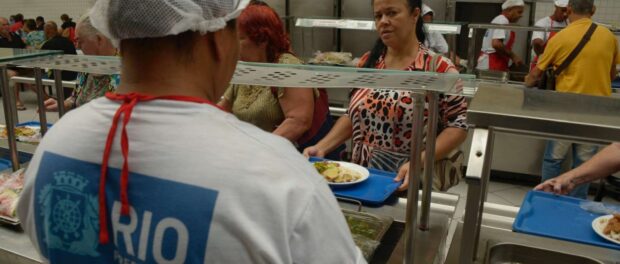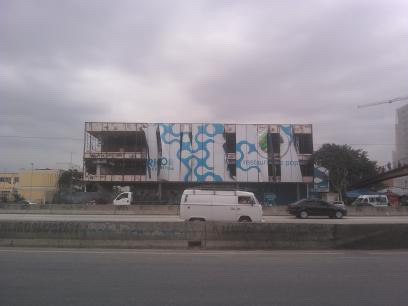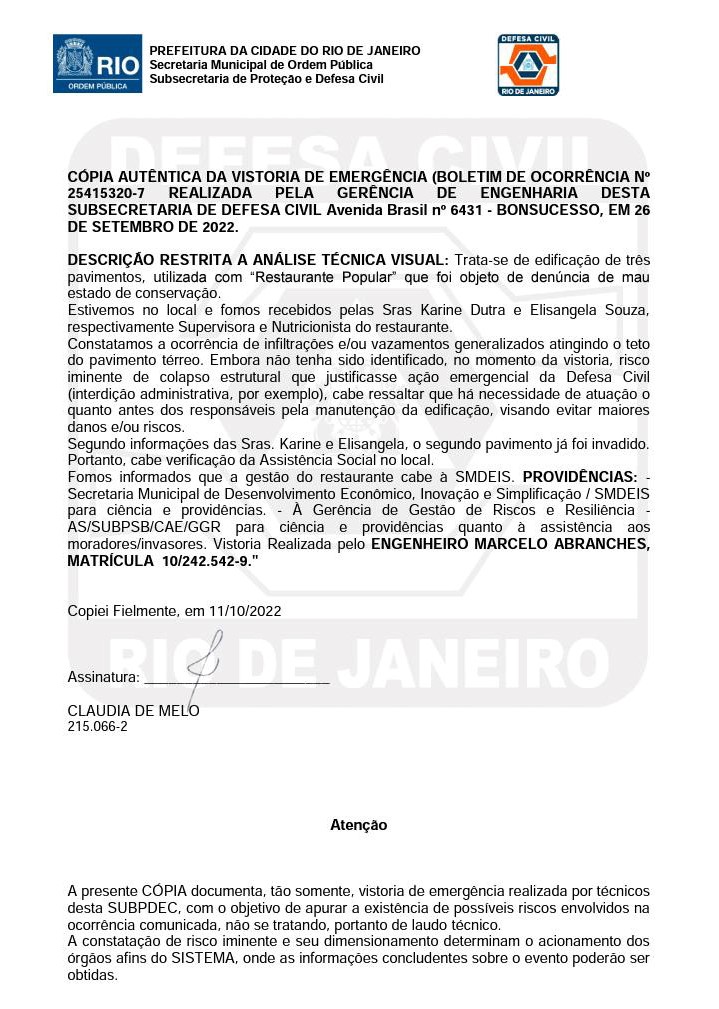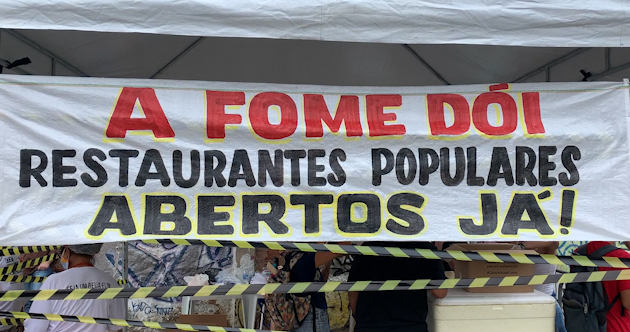
A spoonful of rice, a spoonful of beans, half a spoonful of offal, some chard leaves, an orange, and a glass of a powdered soft drink served on a small, shallow plate: this is what the Bangu Popular Restaurant, run by the Rio de Janeiro city government, serves for lunch to 1,500 people daily. Rio’s popular restaurants, or restaurantes populares, were established as a public policy to provide healthy, affordable meals to city residents through public subsidies.

As researched for this report, this meal was served at the Bangu Popular Restaurant for R$2 (US$0.38) on Thursday, October 20, 2022. According to the World Health Organization, the average adult requires 2,000 calories per day, some 600-700 calories per meal. However, at the popular restaurants in Rio, the small-portioned meals come pre-prepared and there is no option to add or remove any item.
It is worth noting that people in a socially vulnerable position who are nourished have the dignity to seek new possibilities because their most basic need is met.
However, insufficient food portions for those who need it most are not the only problem at the government-run restaurants. There’s also a lack of infrastructure, structural damage, lack of hygiene, flies, rusty chairs, and broken tables, among other things. Finding the restaurant closed is another frequent obstacle. Without first fixing these serious existing problems, and in the midst of a deterioration in public policy surrounding food security, Cláudio Castro—the current governor of the State of Rio de Janeiro—has promised to expand the program.
The Situation
The 2nd National Survey on Food Insecurity in the Context of the Covid-19 Pandemic in Brazil by the Brazilian Research Network on Food and Nutrition Sovereignty and Security (Penssan) found that almost 3 million people went hungry in the State of Rio de Janeiro during the pandemic. In this context, public restaurants have become a resource that many depend on.
Currently, the Greater Rio metropolitan area has five government-run restaurants near favelas and the number of meals served has doubled in one year. The City of Duque de Caxias serves 4,000 meals per day; Niterói, 1,700; Bangu, 1,500; Campo Grande, 1,500; and Bonsucesso, 1,000. The local municipal governments are responsible for the management of each of the popular restaurants.
Despite the fact that, in 2021, the Rio state government closed its popular restaurants in Madureira, Méier, Irajá, City of God and at the Central do Brasil train station—these in the city of Rio alone—Castro promised to reopen these popular restaurants and open five more by the end of 2022. Yet no restaurants have been opened or reopened.
The governor also promised to open 30 more popular restaurants in 2023. According to Castro, the state government would manage all of these new facilities. However, in 2017, the state government handed almost all of the public restaurants that were previously state-run to local municipal authorities.
Unhealthy, Fly-Ridden and Rusty

Despite the small portions, the Bangu Popular Restaurant was clean and in good condition. This was a stark contrast to the restaurant in Bonsucesso—on the edge of Avenida Brasil—whose storefront is almost falling onto the sidewalk and the highway. This unwelcoming appearance serves as an indicator of the conditions inside the building. There are numerous leaks, parts of the ceiling are falling, and tables and chairs are broken. It is not a healthy or safe space for a popular restaurant to operate.
“The tables are in a terrible state, many [of them] are wobbling because one of the legs is shorter than the others, with some iron parts showing signs of rust. For a long time now, people have only had forks to eat with, they don’t give out knives anymore,” complained Levi Germano, a resident of the favelas of Complexo da Maré, who uses the popular restaurant in Bonsucesso on a daily basis.
Germano has tried for a long time to draw the attention of the media, public authorities and society to the structural problems of the popular restaurant in Bonsucesso. “I’ve been trying to pressure the government and the local municipality to do something, requesting information through 1746 [the Rio city government’s complaints and repairs hotline] and the Freedom of Information Act. I even tried to get on TV, but saw no response,” says Germano, who is a law student.

Germano complained about the popular restaurant to Rio’s city government and Health and Safety Department in early October for lack of hygiene. In a statement, the City reported that “the establishment presented a total lack of cleanliness, characterized by the presence of mold on the walls and ceiling; spread of harmful insects; brick structures with peeling paint and putty compromising the food handling sectors. Thus, the company was notified of the irregularities found and ordered to correct structural deficiencies,” says the document, without informing what measures will be taken. Just because it’s a popular restaurant does not mean that users should receive food in an unhealthy environment.
In a report sent to Germano, the Civil Defense pointed out that:
“We found the presence of water damage and/or widespread leaks in the first floor ceiling. Although at the time of the inspection no imminent risk of structural collapse was identified that would justify emergency action by the Civil Defense (such as administrative injunctions), it should be noted that there is a need for action as soon as possible by those responsible for the maintenance of the building, in order to avoid further damage and/or risk.”
Besides the structural and sanitary conditions, the Bonsucesso Popular Restaurant also serves meals in insufficient quantities: “The food is still reasonable, but the quantity is often unsatisfactory. They put salad on the plate as if it were a pinch of salt, very little. [They only serve] one spoonful of beans for two of rice,” Germano concluded.
Renata Guilherme, a photographer and massage therapist born and raised in Maré, describes:
“The kitchen used to be good, but it has gotten much worse since it was taken over by the city government. There are times when they don’t even have beans. I gave up going there… It could help a lot of people who are in need here in Maré, but there are days when they don’t even have rice and beans.”

Even the complaints about the popular restaurant in Bangu and Bonsucesso do not compare to the situation of the one at Central do Brasil, the major transport hub in Central Rio. The Herbert de Souza Popular Restaurant—named after Brazilian anti-hunger pioneer and champion popularly known as Betinho—has been closed since 2016.
For Cosme Fellipsen—tour guide and community leader from Morro da Providência—the popular restaurant at Central would have been fundamental in alleviating the food insecurity that thousands of people have experienced and still experience in the favela:
“Many people don’t even have money to buy food. With R$2 (US$0.38) people used to be able to buy a good meal, and that would certainly help a lot of people here in the favela. It would have been very important during the pandemic.”
The Position of Rio’s City Government
In an official statement issued in response to a request for comment for this article, the Rio de Janeiro Municipal Labor Secretariat reported that “the standard of public restaurant menus is defined in accordance with the conditions established in the contracts signed for the popular restaurants’ management, which were formalized through a bidding process. This standard was established by the Annes Dias Institute, of the Municipal Health Secretariat, signed by a team of nutritionists specialized in promoting healthy eating.”
The Municipal Labor Secretariat continues its statement, placing itself “responsible for monitoring the contracts, [having] an inspection team that monitors the restaurants daily, controlling and monitoring hired service providers to follow the agreed standard.” According to the Secretariat, “due to the daily volume of diners and for operational reasons, there is a single daily menu which guarantees all of the nutritional requirements for that meal. However, it should be noted that there is variation in the menu between the days of the week.”
Regarding the popular restaurant building in Bonsucesso, the city government said that it “is being subject to adjustments in its infrastructure to better serve diners. This issue is being dealt with jointly by the City, the State (owner of the building where the restaurant is located), and the hired service provider. The adaptive measures are being promoted gradually, without interrupting the kitchen’s activities so as to not impact the nourishment of the population [it serves].”
Regarding the fight against hunger and food insecurity, the city government claims to have adopted other public policies, such as the Prato Feito Carioca and Community Kitchens programs. In a statement it says that “the expansion of the number of popular restaurants may occur with the identification of compatible spaces for new establishments of this nature, as well as the availability of funds.”
In September 2022, 8,713 breakfasts and 15,796 meals were served at the popular restaurant in Bonsucesso, 32,057 meals and 7,823 breakfasts in Campo Grande, and 28,215 meals and 6,342 breakfasts in Bangu.
As Betinho used to say, “those who are hungry are in a hurry.” Regardless of the name of the program and the mayor or governor, hunger is an urgent issue and should be treated as such.
